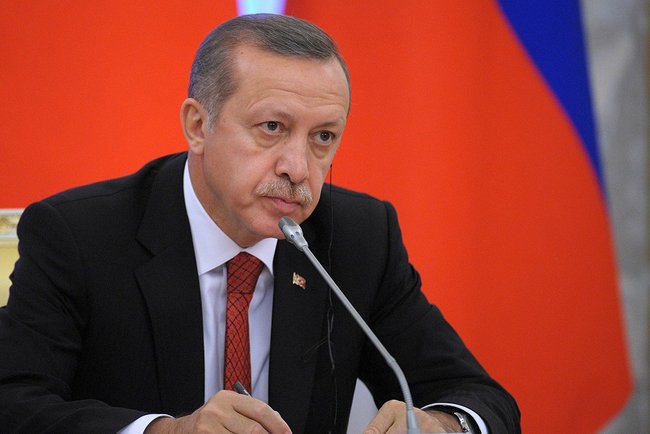Tensions in the Eastern Mediterranean are likely to rise after President Erdogan and the head of the Libyan Government of National Accord (GNA), Fayaz al-Sarraj concluded a maritime and military agreement. The maritime agreement is significant for Ankara because it allows Turkey to extend its maritime borders to areas of the Eastern Mediterranean where considerable oil and gas deposits have been discovered in recent years. The area stretching from south-west Turkey to north-east Libya crosses an area currently claimed by Greece and Cyprus where plans for a future gas pipeline are being drawn up to connect the gas fields of the Eastern Mediterranean to European markets. The two European states have contended that the Turkish maritime agreement is contrary to international maritime law and their sovereign rights. As a result, the Greek authorities have removed the Libyan Ambassador to Greece.
The security and military cooperation agreement between President Erdogan and al-Sarraj allows Turkey to be more implicated in the Libyan conflict. The Turkish leader has sought to profit from this deal by calling the Turkish parliament to vote on January 7 on a motion to send Turkish forces to Libya to support the GNA in its fight against the head of the Libyan National Army Khalifa Haftar.
Continuation of Turkey’s expansionist policy under President Erdogan
President Erdogan’s endeavour to seize the hydrocarbon deposits in the Eastern Mediterranean is part of his expansionist foreign policy. Erdogan’s new initiative only reduces the confidence of Ankara’s Western allies in his presidency. This crisis of confidence between Turkey and the West began during the first years of the Syrian conflict when it became clear that Turkey was supporting militias linked to Al-Qaida. It has worsened since the Turkish President made three incursions into Kurdish territories of Syria. In this sense, it is not surprising that European leaders have condemned the maritime agreement between Turkey and the GNA since it disadvantages the economic interests of two European Union member states.
Yet for President Erdogan, the two agreements concluded with the GNA leader are necessary to stabilise a Turkish economy which has been regressing since 2018 and to unite the Turkish population around his foreign policy. This initiative is imperative for the Turkish leader because he is going through his greatest political ordeal since coming to power. Indeed, the Turkish economy no longer inspires confidence among investors because of the decisions taken by President Erdogan. In July 2019, the Turkish President removed the Governor of the Turkish Central Bank, which led to a 2 % fall in the national currency, which had already lost 30 % of its value in 2018. On the national political scene, Erdogan’s political party the AKP, suffered political setbacks in 2019, notably losing Ankara and Istanbul to the opposition during the municipal elections. Moreover, Erdogan’s former allies, notably Ahmet Davutoglu and Ali Babacan have distanced themselves from the Turkish leader. Thus, Turkey’s increased involvement in the Eastern Mediterranean is part of the Turkish President’s endeavour to tilt the balance of power in his favour and to unite the conservative and nationalist members of Turkish society with his authority.
Possible repercussions for al-Sarraj
The United States and European powers have repeatedly told the GNA, who are comprised of many islamist supporters, that strengthening relations with Turkey could lead them to stop supporting al-Sarraj’s political interests. However, the GNA could contend that since Marshal Haftar’s offensive in April 2019, Western powers have been reluctant to intervene in their favour against the leader of Eastern Libya. The GNA have also had to deal with attacks by Emirati drones and attacks by Russian mercenaries belonging to the Russian security company Wagner, close to the Kremlin. In this sense, for al-Sarraj, the support of Turkey, which is the second largest army of the North Atlantic Treaty Organisation (NATO) is essential if he is to maintain his authority in Tripoli. Yet, given the strengthening of the GNA’s relations with Turkey, al-Sarraj will most likely see the end of official support from Western powers, especially those in Europe, in the coming months.
Perspective
Turkey’s increased involvement in the Libyan crisis risks aggravating the security situation in Libya and around the Eastern Mediterranean. President Erdogan’s policy towards Libya stems from its isolation in the Eastern Mediterranean. The Turkish President’s strategic errors, including his refusal to recognise the Egyptian government of President Abdul Fattah al-Sisi after the removal of President Morsi from office, have strained relations with the Saudi and Emirati leaders. The Turkish President’s intention to send troops to Libya risks intensifying hostilities on the front line. By wanting to send Turkish forces, President Erdogan risks confronting directly the Russian mercenaries who support Marshal Haftar. Clashes between Turkish and Russian forces could weaken the fruitful relations between Ankara and Moscow and thus affect cooperation between the two nations in the management of the Syrian crisis. Since November 2019, Russian and Turkish soldiers have been jointly patrolling a strip of territory tens of kilometres long in northern Syria to ensure the total withdrawal of Kurdish forces from the region.
The intervention of Turkish forces in the Libyan conflict could also lead to further engagement of Egypt in the conflict. Given that Egypt shares 100 kilometres of border with Libya, its security is an important issue for al-Sisi. For the Egyptian leader, Marshal Haftar would be best placed to fight against movements linked to political Islam and against jihadist groups in Libya. Moreover, a Turkish intervention could lead to stronger support from France, United Arab Emirates and even Greece in the conflict, fearing a Libyan state under Erdogan’s tutelage. It is no coincidence that, following the maritime agreement between Erdogan and al-Sarraj, Greece now supports Marshal Haftar. On 23 December, the Greek Foreign Minister visited the strongman of Eastern Libya. Tensions in Libya and the Eastern Mediterranean could therefore escalate in the coming months.
Image credit: Kremlin.ru [CC BY 3.0], via Wikimedia Commons
The views and opinions expressed in this article are those of the author and do not necessarily reflect the official policy or position of The Geopolitics.

The author has recently graduated with a Masters in International Relations from the University of New South Wales, Sydney, Australia. His research interests are focussed on geopolitical and security issues specific to the Middle East and their impact on European powers.


